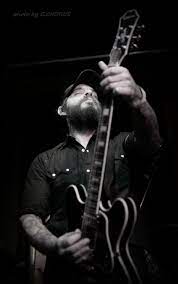HIT CHANNEL EXCLUSIVE INTERVIEW: January 2012. We talked to Justin Greaves from Crippled Black Phoenix, who just released the magnificent double album “(Mankind) The Crafty Ape”. Multi-instrumentalist Justin Greaves is the songwriting genius of Crippled Black Phoenix, one of the very few really inspired bands of our times. He talked to us about their new album “(Mankind) The Crafty Ape” (by Mascot Records), their scheduled Greek shows. He also shared with us his thoughts about music, trends, press and many other things. Read below the very interesting things he told us:
 Can we say that you ‘ve been in a creative overdose while making “(Mankind) The Crafty Ape”?
Can we say that you ‘ve been in a creative overdose while making “(Mankind) The Crafty Ape”?
Creative overdose?! Right ! (Laughs) It is what it sounds like. Although, there is more music to come out. I have more music than that is actually appears on the album. We did a couple more songs. There is actually more material.
The double album was a planned decision or it happened on the way?
Yeah, it did happen on the way. I didn’t want to make a double album. I wanted to make an album with an idea which features in three chapters. During the recording process there were a couple of little parts and a couple of songs a little more extensive. Although, we weren’t prepared for a double album, we did 86 minutes of music and because label had 86 minutes of music, and because no-one from the label or us, wanted to drop anything, the label said “let’s put out a double album”. That’s what we did. That’s the way because we did that material for the album and it had to be featured on the album.
Is “Operation Mincemeat” song about the WWII deception plan or it’s allegoric for every case of deception and misinformation?
Oh, it’s both really. The actual story of the song is about the World War II deception plan. So yeah, based on that story you can say it represents any kind of deception or misinformation or anything similar. You know, the whole album is about how people could be corrupted or crafty or whatever. That’s an example of the real nature of the human (laughs). In this case, in the case of Operation Mincemeat is a weird way, the tramp they used, the already dead guy, he actually found a redemption because he lived a tough life and he wasn’t a very nice guy, but this guy he helped to win the war, in a way (laughs). He had a very twisted fate, but it’s all true.
Yes, I know. I’m obsessed with the true stories.
(Laughs) Yeah, right. It’s one of those things you can find out. It’s a crazy story. A real one.
Τhere are some spoken words in the end of “Laying Traps”? Who is the person who says those words?
(Laughs- coughs-laughs) It’s from a TV programme called “Catterick”. It’s the comedian who makes the programme for years. It’s very dark humor and very silly as well. One of those characters, is Kinky John Fowler and he’s the detective on this programme. I’m a very big fan of the actual comedian, Vic Reeves. I like his sense of humour, I always liked his sense of humour anyway. Yeah, the kind of words he says about the people and the environment, it’s ok and looking after everything, it’s a kind of related with the subject of the song in a different way. It’s about how to manipulate people again (laughs).
 From which country the world music elements in the new album, come from?
From which country the world music elements in the new album, come from?
We haven’t taken anything from one traditional song. We haven’t taken anything from one country in particular. I think we’ ve just been influenced by world music and we are taking an interest in it. That’s how we work. We don’t want to modernize those elements. We don’t want to take those elements of world music and just make them into something else, make them into rock music. Not too much anyway. It’s a kind of pay respect and it’s also to try make it hear authentic. It’s like the song “(What)” with banjo, dobro and Karl (ed:Demata, electric and slide guitar) played the mandolin and I played anything else, and it turned that song into an almost jazz feelgood. We paid respect and it’s an interesting instrument (ed: mandolin) and the different sounds in the album make it more interesting. That’s what I feel.
You are now in a new recording label, Mascot. What expectations do you have from this change?
Well, I don’t really have any expectations, to be honest. That’s what I feel since the very start, I never expected anything. Whatever comes along, it’s always the best. I don’t have expectations, in a way. But the new label I think it’s great, it’s such a nice change. Before, we had always to push the label to have things done. In a way, it seems like they were making the things difficult from their point. But with the new label, they actually push me, they push the band to do more. But that’s not quite bad, because I’m actually productive and I found a label very very proactive. The new label is emailing me all the time, to do this, to do that. It’s such a really big change. When you have a band, you want a label to release your music. We needed a label which has been built to accommodate what we need. We don’t do mainstream music, so we don’t have to compromise very much on anything. We’re not very good in compromising (laughs).
Is in each person’s nature..
Yeah, exactly. It’s difficult to play the games they play.
In which way a CBP song is written? It’s more personal compositions or you work the song together?
No, it’s definitely more personal. In a way, I write the songs. I started making demos. I mean in the previous albums, I didn’t need to make demos, I just needed to write songs and remember them and then record them in the studio. But nowadays, we have a full band, I have to think of those guys and I have to make demos. I always give them the title and the theme of the songs. A have a document in my computer which is full of ideas and some titles and some words and things like that. I send them and we develop a couple of songs and when we record them, we develop all the songs, it’s like a big developing process. But the foundations and the song structures and the melodies on the tunes are written by myself and then it goes on.
 Why Kostas Panagiotou left the band? Is he still in the band?
Why Kostas Panagiotou left the band? Is he still in the band?
No, unfortunately not. We’re still great friends, but he couldn’t find the time to do this band. He has a very very important job, he’s like a counsel of victims of crime and it’s quite heavy, though. So, he couldn’t do overtime with this band, he has another band, Pantheist. Crippled Black Phoenix is my thing, Pantheist is his thing. He said “I don’t want to let you down, it’s pretty unfair to do it. I’m out now, but some other person can do it”. I really, really like Kostas, he’s a great guy. He’s one of those guys you want to play with, but we’re still friends now, you know.
Do you think CBP music is the perfect soundtrack for urban people or it applies to anyone?
I hope it’s for anyone (laughs). We have a very wide spectrum of audience.
Yes, but your music is more claustrophobic, it’s about the fears of the modern people. It’s not sparse music. It’s about the anxious modern-age people.
(Laughs) I guess so. I think you can be quite cynical. I don’t mean personally. I realised that the music is not for everybody. We don’t play mainstream music, I don’t want to be in one particular song or another. I don’t want to be part of anything. In a way, it tends to restrict you and people start to expect you to be something. I try to make honest music, that’s the most important thing for me. If it sounds good to me, I’m pleased. I don’t care about what opinion has one person or another. I’m pleased if everyone can do such a thing.
Tell us about your decision to record a cover to Pink Floyd’s “Run Like Hell”? Will you play it live? (I started whispering continuously “I hope, I hope”).
(Mad laughs) I don’t know, I don’t know. I’m just trying to focus on how we would sound. We have to see first how the rehearsals will go, with all the persons involved, I don’t know yet. We would like to play one of the covers we have recorded.
 (Journey’s) “Of A Lifetime”.
(Journey’s) “Of A Lifetime”.
Yeah, probably we will cover “Of A Lifetime”. I think we will play that one. I don’t know what other we will do. We haven’t rehearsed yet. If the rehearsals go well and we have more time, we can rehearse more songs, you know. Also, we could change hearts. We basically recorded that song (“Run Like Hell”) because we want to do it. I think we did that song because it was the less obvious. We could also do some other songs like “Waiting for The Worms” or “In The Flesh”, but I think we did that one because it was the less obvious song to do.
You like ‘70s progressive rock music, right?
Oh yeah. The early stuff.
Me too. Recently, our friend Steven Wilson from Porcupine Tree said “Progressive rock has always been a pariah. It’s acceptable to say that you like Joy Division, Sonic Youth or My Bloody Valentine, but you cannot say that you like Pink Floyd or King Crimson or Yes and that is RIDICULOUS ”! Steven said that.
(Ed:He interrupts me) It’s a kind of ridiculous, I think. I love Pink Floyd, you know (laughs).
That’s my question: Do you think mainstream music press terrorizes younger listeners when calls those progressive rock bands as “dinosauric rock”? I mean to this day they say “Pink Floyd are uncool and Nirvana are cool” .
Yeah, the press sets the trends on anything. The journalists in the mainstream they tend to think the trends as the things that are cool at the time. They don’t care about what is true or not true. They care of what they want to hear. That’s not an easy subject. But on one hand, the classic rock, the progressive rock media, they want to keep progressive rock for themselves, they say “oh, that’s not for everybody”, they are trying to make it more elitist and that’s what it looks cool on their eyes. And on the other hand when kids starts to like it, they don’t want other people to like it (laughs). But now there is a trend for kids to listen to the music of Pink Floyd and that kind of things. But you have not to listen to something based on the terms of what’s cool. They want to claim it for themselves. Even more people would listen to it, they think progressive rock is a discovery. Because not many people like it, that’s make it better. But the thing is, I think most people like progressive rock, but people just don’t want to talk about it to everyone.
Because they are afraid to do it! I saw the same thing, when people who called Pink Floyd “dinosauric rock”, when Roger Waters played and filmed for a DVD three “The Wall” shows in Athens last July, the very same people went there and really liked it. It’s ridiculous, Steven is right!
Yeah, exactly (laughs). It’s ridiculous in a way. There are hypocrites when they say they are dinosaurs or whatever and then they go and like the show. Some people like Roger Waters (ed: my hero),he’s still agey, he’s still relevant in the modern days, he has still a lot of things to say. He’s a very intelligent guy, he has made some really really good music.
 But if you, Justin Greaves, say “I would like to work with Roger Waters” you won’t be in the headlines, if you say “I would like to work with Dave Grohl” you will be.
But if you, Justin Greaves, say “I would like to work with Roger Waters” you won’t be in the headlines, if you say “I would like to work with Dave Grohl” you will be.
(Mad Laughs) Yeah. But from the kind of music I do when I would say “I would like to work with Roger Waters”, people would think of it as something mainstream and boring and not very cool. Because people would like to hear people who want to work with really obscure, underground artists. Because, that’s more cool.
If you would say “with Robert Fripp (King Crimson)” they would react the same.
Yeah, that’s right (laughs). I think a lot of people don’t realise what actually Robert Fripp does.
My idea is that some later music is a lot more “dinosauric” than ‘70s music. I think bands like Manowar or Winger or Bon Jovi more “dinosaurs” musically than Pink Floyd or King Crimson.
That’s the cynical of like pop music and true meaning of like progressive music, as it existed from 1969 to 1973-4. It wasn’t about what kind of music it was, it was because music was genuine and fresh and experimental. People were trying new things. Then Pink Floyd, King Crimson and that kind of bands, they made music which is timeless. It’s just irrelevant how you can call it, they put out albums and people enjoyed them. That’s happened many years ago and it still sounds good, they were pushing boundaries. Now progressive music has to sound in a certain way. It’s not about liking one band or another, it happened because people did what they want, there were pushing boundaries, they didn’t want to make extreme music. Because being progressive it doesn’t mean you have to be extreme.
In a way it is extreme. When you write 14-minutes songs, it’s extreme. It means, you reject the trends.
I think so. I guess it is. It’s more extreme than most bands do. You haven’t to conform to some extreme time signatures or weird things like that, you know. The bands I like, the music l like is quite simple. I think “progressive” means you always move on, you don’t repeat yourself, you always trying different things.
 To remain unpredictable.
To remain unpredictable.
Unpredictable. Exactly.I don’t think many bands do that today. In general, they are afraid to do it because they think people would knock them out. Which they will do it anyway, you know (laughs). When they have a success, no-one allows them to change anything, they keep repeating themselves and that could be very boring.
Which was the last great album you listened to?
Uh.. You mean a new one? At the moment, I really like a band called Arbouretum. They are an American band, they’are hypnotic. They have some main guitar sounds which are very hypnotic, which is something really really cool. I also like.. I can’t remember it at the moment.
I really liked the latest Tom Waits album (“Bad As Me”).
Yeah, I like it. Obviously, Tom Waits it’s a great artist. I listen to a lot of music in the car, because I drive a lot.
Is it possible to do some more collaboration with David Eugene Edwards (16 Horsepower, WovenHand)?
We will see. I think we will do another one song with him. If it will come up, we will do it. I have spoken to him and he’s a very cool guy, a very nice guy. He has an amazing voice. When we did “Just Like a Mexican Love”, I think it was the best I have ever done. It was great to work with him and the show we did with WovenHand, that was really cool. Yeah, we have talked about it, we will definitely do something more in the future. I think we will do one more song for a Jeffrey Lee Pierce album. I think it’s about time, if he will have time to do, if we will have time to do it.
Can you give us a vague idea of what we have to expect from Greek shows? A lengthy setlist first.
(Laughs) I won’t tell you the setlist. Obviously with a new album, we will play a lot of the new songs . We have been playing the same kind of setlist for two years now. So, we will try to change it a little bit. When was the last time we had been in Greece? I think it was 2009. I think the Greek audience owes to hear songs from “I,Vigilante”. So, we will definitely play most of it and a lot from the new album. I want to put in some really old songs. Songs we haven’t played since 2006. So, it might be a couple of really old songs (laughs).
 Good, I would like to hear a non standard setlist.
Good, I would like to hear a non standard setlist.
It won’t be a standard setlist. It depends on how much time we will get to play. I’m promising a very long one. We usually play for about 2 hours, this time we are going to play for about 2 ½ hours if we have enough time. I think we will play a long set. I think we could even do two sets. We will see how the situation will be.
I will be there anyway.
See you in Greece, man.
A huge “THANK YOU” to Justin Greaves.
Please check out www.crippledblackphoenix.co.uk and http://www.facebook.com/pages/CRIPPLED-BLACK-PHOENIX-official/111441865546099?sk=wall

